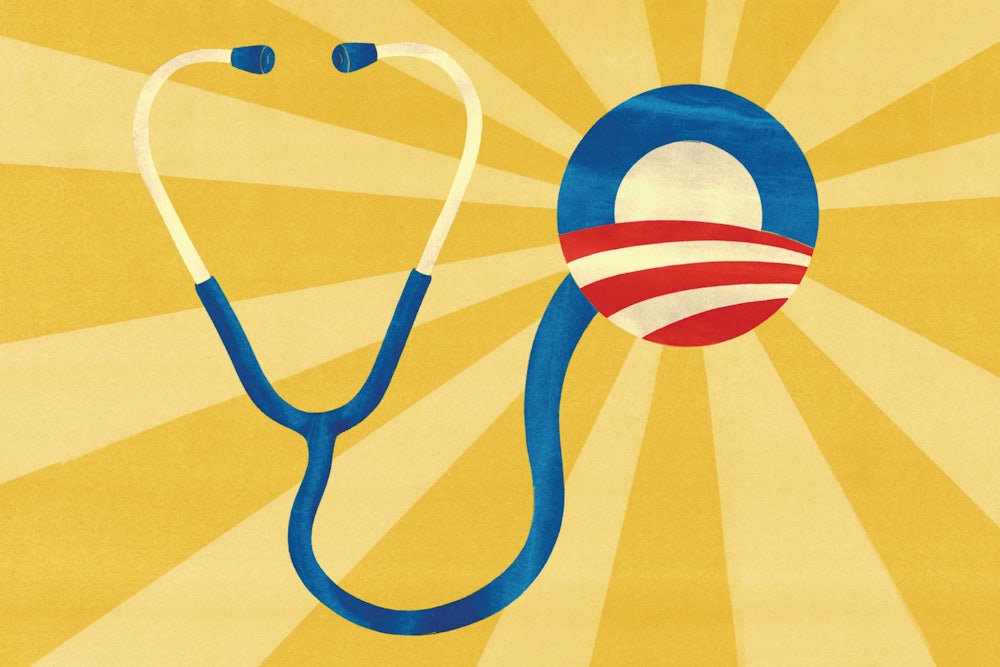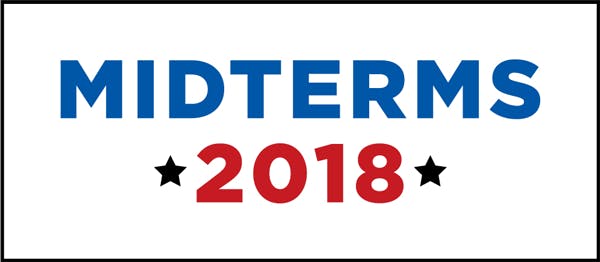In 2009, when Barack Obama traveled to Bristol, Virginia, for a town hall to promote the Affordable Care Act, his motorcade passed a small but turbulent protest. I was raised just outside this small Appalachian city, and even then, three years after graduating from high school, I knew it desperately needed health care reform. At the time, according to data compiled by the Urban Institute, almost a fifth of Bristol’s residents under age 65 had no health insurance—one of the highest rates in the state. And yet, when Obama arrived, people greeted him with signs that read SOCIALISM ISN’T COOL and OBAMA: “GOD” DECIDES LIFE AND DEATH NOT YOU OR NATIONAL HEALTHCARE.
Six months into his first term, Obama was facing this kind of opposition not just in Bristol, but nationwide, even in districts he’d won the previous fall. Alarmed by conservative talk radio hosts and the constant harping of an intransigent Republican Party, many Americans believed that the ACA would rip apart the fabric of American life. “No one should be surprised at the coming embrace of euthanasia,” conservative columnist Cal Thomas warned.
Despite the opposition, Democrats were promising that Obamacare would eventually boost their chances in elections, as Americans gradually came to see the benefits of the law: It made sure that preexisting conditions were no longer cause for discrimination, and gave people with diabetes, cancer, and other serious conditions a chance to afford health insurance. “As people learn about the bill, it’s going to be more and more popular,” Senator Chuck Schumer said in March 2010. “By November, those who voted for health care will find it an asset, those who voted against it will find it a liability.”
What Schumer predicted never happened, at least not that year. A few months later, the GOP picked up 63 seats in the House and six in the Senate. A study published the following year estimated that at least 13 House Democrats lost their seats because of their support for the law. With the Tea Party sweeping into office, the ACA threatened to drag Democrats down.
This year, the prevailing attitude toward the ACA has changed. In West Virginia, in a September campaign ad, Senator Joe Manchin, perhaps the most conservative Democrat in the Senate, blasted a paper copy of a lawsuit challenging the ACA with a rifle. In Ohio, Democratic gubernatorial nominee Rich Cordray pledged to protect the state’s ACA Medicaid expansion from Republican interference. And in Wisconsin, Democratic gubernatorial candidate Tony Evers has repeatedly attacked Republican incumbent Scott Walker for joining a multistate lawsuit opposing the ACA. “If you want to protect the millions of Wisconsinites with a preexisting condition, drop Wisconsin from this lawsuit,” Evers said in September.
It’s not hard to see why Democrats are now eager to align themselves with Obamacare. Last year, for the first time, Gallup reported that a majority of Americans viewed the law favorably. This past March, the Kaiser Family Foundation released another poll that put public support for the law at 54 percent, the highest it’s been since 2010. Nationally, confidence in the Democratic Party’s ability to help solve health care is at its highest level since 2006, the last time there was a blue wave in the midterms.
Republican rhetoric suggests they understand this. It’s astonishing to watch a candidate like Michigan’s Republican attorney general, Bill Schuette, frame himself as a champion of government health care. He campaigned on repeal and replace in 2010, and as attorney general repeatedly joined lawsuits intended to strike down key provisions of the ACA. Seven years later, with about 660,000 Michigan residents enrolled in the state’s Medicaid expansion program, Schuette, who is running for governor, no longer opposes the plan. Similarly, in Virginia, some Republicans revolted against their party leadership in May, joining Democrats to pass a bill that expanded Medicaid under the ACA in the state. Some were coalfield Republicans, representing Virginians not far from Bristol’s 2009 picket.
Conservatives are partly responsible for the shift. For the better part of a decade, they promised to “repeal and replace” Obamacare, if voters only gave them the chance. But even with a unified government, the party failed—twice. Ironically, their attacks on the ACA may actually have convinced voters of its importance. Last March, as Republicans made their first attempt to replace the ACA, only 38 percent of independents supported the law. Over the next two months, with Republicans sniping at one another on television, these swing voters grew more uneasy about the idea that they might actually lose the ACA. By May, support for the law among independents had ticked up 10 points. The ACA, once a “radical” proposal, had become something more familiar, perhaps even reassuring, to swing voters. And in flippable districts like Wisconsin’s 1st, Virginia’s 7th, and New York’s 19th, that could be the difference between Democrats taking the House in November or not.
Now that Obamacare is finally winning majority approval, many Democrats are pushing for something more ambitious: Medicare for All. Popularized by Senator Bernie Sanders in 2016, the plan, a version of single payer, has growing support, but the polling is more complicated. Some polls show it with roughly the same support as the ACA, others with more, a few with much less.
Republicans, sensing that the numbers are mixed, have tried to capitalize. Internal Republican polling, reported by Axios in September, asserts that attacks on Medicare for All are “the best-performing message” with key demographics, including seniors and suburban women. Andy Barr, the Republican incumbent in Kentucky’s 6th Congressional District, has claimed that his Democratic challenger—charismatic former Marine pilot Amy McGrath—would end “Medicare as we know it,” if she were able to push Medicare for All through Congress. Similarly, as Dave Weigel of The Washington Post has reported, Representative Dave Brat of Virginia, a Tea Party favorite who unseated the powerful Eric Cantor in 2014, said in a recent ad that his Democratic challenger, Abigail Spanberger, would “bankrupt Medicare as we know it.”
Facing these attacks, Democrats may wonder if they should simply make a public show of affirming their support for the ACA and leave it at that. But voters know, after almost a decade living with the law, that it did not create “communist death panels” or lines like those at the DMV. Increased government involvement in the provision of health care—in this case, through subsidies for private insurance, and in some states, the expansion of Medicaid access—does not create shortages of doctors or overcrowded hospitals, and voters understand that now. While Medicare for All isn’t yet a guaranteed winner in all the districts Democrats need to control the House, these are encouraging signs that it, like the ACA, may one day be accepted law, with a radical reputation in the rearview mirror. In the meantime, Democrats shouldn’t abandon Obamacare now that it finally works for them. Instead, they should embrace the law for what it has revealed itself to be: proof that progress is possible.
Correction: A previous version of this article incorrectly identified Bill Schuette as Michigan’s governor. We regret the error.

